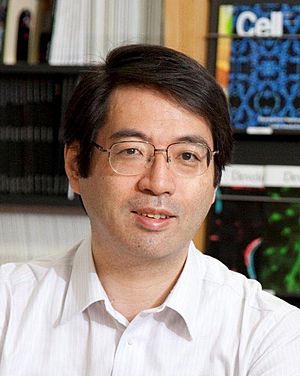Yoshiki Sasai facts for kids
Quick facts for kids
Yoshiki Sasai
|
|
|---|---|

Sasai, c. 2012
|
|
| Born | 5 March 1962 Hyogo, Japan
|
| Died | 5 August 2014 (aged 52) Kobe, Hyogo, Japan
|
| Nationality | Japanese |
| Alma mater | Kyoto University |
| Awards | Osaka Science Prize Inoue Prize for Science |
| Scientific career | |
| Fields | Biology |
| Institutions | RIKEN |
| Doctoral advisor | Shigetada Nakanishi |
Yoshiki Sasai (born 5 March 1962) was a Japanese scientist who studied stem cells. Stem cells are special cells that can turn into many different types of cells in the body. Dr. Sasai was famous for finding ways to grow tiny organ-like structures, such as parts of the brain and eyes, from human stem cells in his lab. He worked at the RIKEN Center for Developmental Biology in Kobe, Japan.
Early Life and Learning
Yoshiki Sasai was born in 1962 in Hyogo, Japan. He went to Kyoto University to study medicine. In 1986, he finished his medical degree. Later, in 1993, he earned his PhD from the same university. A PhD means he became an expert in his field of study.
Amazing Science Work
Dr. Sasai worked as a researcher at the UCLA School of Medicine in the United States until 1996. After that, he returned to Kyoto University in Japan. He became a professor there in 1998.
In 2003, he moved to the RIKEN Center for Developmental Biology. There, he led a group that studied how organs and nerve systems develop.
Dr. Sasai was well-known for his amazing work with stem cells. He found ways to make these special cells grow into tiny versions of organs. These tiny organs are called "organoids."
In 2012, he made a big discovery. He was the first scientist to grow an optic cup from human cells. An optic cup is a part of the eye that forms during development. This was a huge step forward in understanding how our bodies grow.
Awards and Special Honours
Dr. Sasai received several important awards for his scientific discoveries:
- 2010: He won the Osaka Science Prize for his work on growing brain parts in the lab.
- 2012: He received the Inoue Prize for Science.
- 2013: He was given the Hans Sigrist Prize.
See also
- List of scientific misconduct incidents
 | William L. Dawson |
 | W. E. B. Du Bois |
 | Harry Belafonte |

